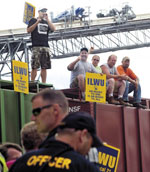
Showdown on West Coast Docks: The Battle of Longview
(November 2011).
click on photo for article
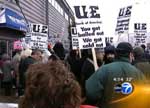
Chicago Plant Occupation Electrifies Labor
(December 2008).
click on photo for article
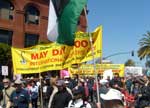
May Day Strike Against the War Shuts Down
U.S. West Coast Ports
(May 2008)
click on photo for article

January 2021
A Fight
for All Workers
Hunts Point
Teamster Strike
Shows Potential for Labor Upsurge
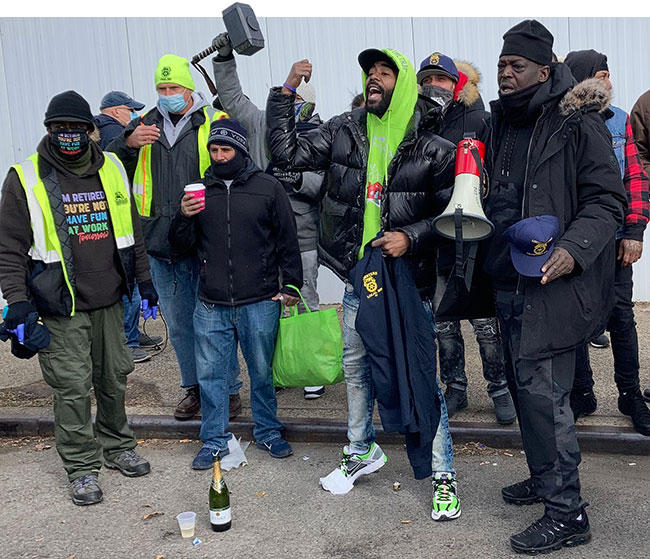
Hunts Point strikers after approving contract, January 23. (Internationalist photo)
JANUARY 30 – The week-long strike by 1,400 mainly Latino and black workers at the Hunts Point Produce Market in the Bronx was the first major labor battle of 2021, and it ended with gains for the strikers, who are members of the Teamsters union. The market supplies 60% of the fruits and vegetables consumed in New York City, and together with the adjacent meat and fish markets it is the largest fresh food distribution center in the U.S. The workers have been on the job throughout the COVID-19 pandemic, keeping the city and surrounding region supplied with produce. They work in, and many come from, the South Bronx area that is the poorest congressional district in the nation, and which has been hard-hit with some of the highest rates of infection in NYC. The strike drew national attention, taking place amid a changing of the guard in Washington as labor-hating Republican Donald Trump was replaced by phony “friend of labor” Democrat Joe Biden as the chief executive officer of U.S. capitalism.
International Brotherhood of Teamsters Local 202 called the strike as the contract expired. It was their first strike in 35 years. Before the walkout, workers were mostly making between $18 and $21 an hour, hardly a “living wage” in New York City. Traditionally supplying restaurants and greengrocers, as many of the former shut down or cut back due to pandemic quarantine orders, the market delivered to groceries and bodegas throughout the NYC metro area. As truly essential workers, the Hunts Point Teamsters move about 300,000 pounds of fruits and vegetables a day, keeping New Yorkers fed in these trying times. Prior to the pandemic, 15,000 trucks would go in and out of Hunts Point daily. Working at close quarters in the produce market, hundreds of workers fell ill with the coronavirus. A number died, including Local 202 members Fernando Gordon, Gregory Treadwell, Jamie Hatcher and Victor Vasquez. Meanwhile, the bosses raked in $15 million in pandemic Paycheck Protection Program aid from the government.
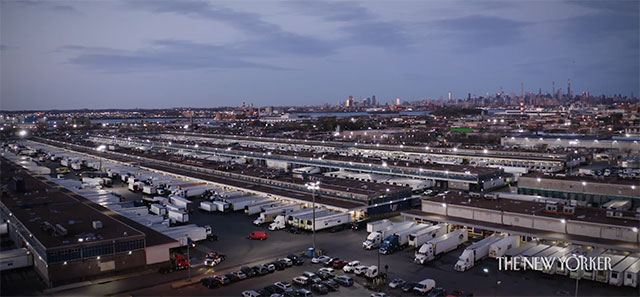
Hunts Point is vast, the largest food distribution center in the United States. (Screenshot from New Yorker video)
Hunts Point is the most central point in the food chain that feeds the city and surrounding region. As the strike loomed, the New York Daily News (14 January) warned, “Break out the frozen veggies.” The Teamsters demanded modest raises of $1 an hour in each of the three years of the contract, as well as a $0.60 an hour increase to the health benefits fund. The Hunts Point Produce Market “cooperative” board, representing the bosses of 29 food distribution companies, insultingly said that the workers should be “grateful” to have jobs during the pandemic. The bosses “offered” paltry raises of 32 cents/hour for each year of the contract, much lower than the increased cost of living due to inflation. With this “slap in the face,” as one union official put it, the fight was on.
From Day One of the strike, supporters of the Internationalist Group, Trabajadores Internacionales Clasistas (Class Struggle International Workers) and CUNY Internationalist Clubs mobilized in support of the workers’ struggle. On January 18 the Internationalist Group issued a leaflet, “NYC Labor: All Out to Support Hunts Point Market Strikers!” of which hundreds of copies were distributed to strikers. We joined the strike lines daily, usually two or three shifts a day, with signs in support of the strike and declaring, “Picket Lines Mean Don’t Cross, Period!” Students from the City University of New York were greeted warmly by workers, as they have been at strikes and organizing drives at Verizon, B&H Photo, Spectrum and elsewhere in recent years. Many workers’ children have attended CUNY, one of the few ways working people in New York City can get a higher education.
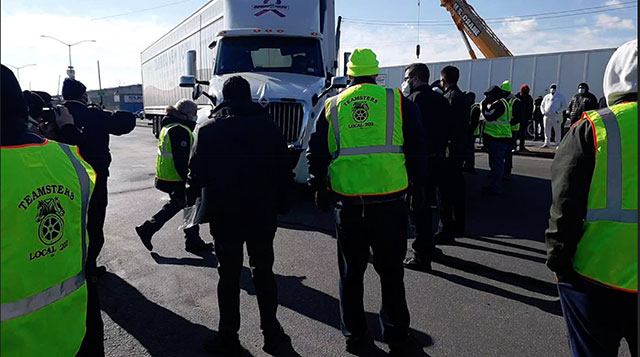
Early on, Hunts Point strikers convinced many truckers not to go into the struck market. (Internationalist phto)
Early in the strike, union members showed their militancy and desire to fight to win against the arrogant bosses. Sometimes the cops were able to escort trucks in, but in many cases pickets would congregate in front of the trucks, convincing the driver to leave. In a dramatic scene, at midnight on the start of the third day of the strike, workers on the line were stopping trucks from coming in when a swarm of cops in riot gear – Democratic mayor Bill de Blasio’s NYPD – moved in to break the workers’ picket. It was a vivid demonstration that the police are enforcers of the bosses’ “law and order.” Aware of the danger of racist cop violence and echoing last summer’s mass protests, strikers held up their hands, saying “Don’t shoot.” The police arrested five strikers, charging them with disorderly conduct. The workers, unbowed, were back picketing by 3 a.m.
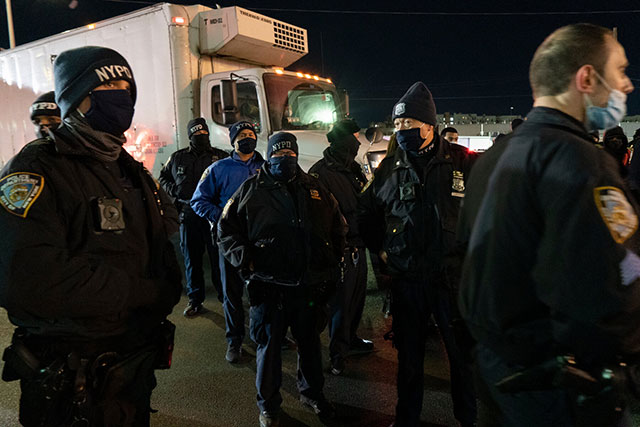
But then scab-herding NYPD cops arrested strikers and escorted trucks into the struck market. An object lesson in the nature of the police, the armed fist of the bosses. (James Estrin / The New York Times)
On Wednesday, the fourth day of the strike, a freight train with 21 cars heading into the market was turned around. After that no trains entered the market. As the strike began to hit the bosses’ revenues and affect the food supply chain, Democratic New York governor Andrew Cuomo pressured for a return to the bargaining table. On Friday afternoon, Local 202 officials announced that a deal had been reached, and on Saturday the deal was approved by the strikers by a 285 to 6 vote. Most workers will receive raises totaling $1.85 over the three years, bringing their base pay up to $20.42, while the top-paid workers will receive raises totaling $1.20 and a $1,300 bonus in the third year. The companies will increase their contribution to the health care fund by $0.40/hour and the workers will receive one additional sick day and two more floating holidays per year. The bosses’ original demands to change overtime rules were rebuffed.
“When we fight, we win,” is a popular slogan we heard during the strike. Unfortunately, that is not always the case, though the opposite is certainly true: if we don’t fight, workers always lose. At Hunts Point, the popular strike won gains which, although limited, could encourage labor struggle around the country. “We fought this battle for the rest of the working people of this country,” said Local 202 president Danny Kane. Around the U.S., many employers have been itching to use the pandemic as an excuse to bust unions, while many workers are fed up with being treated as expendable, risking their health for poverty pay, even as they are hailed as essential. The Hunts Point strike was a modest victory for our side, against the bosses. To win big, it’s necessary to massively mobilize the power of the working class.
“That’s the Power of Unity”
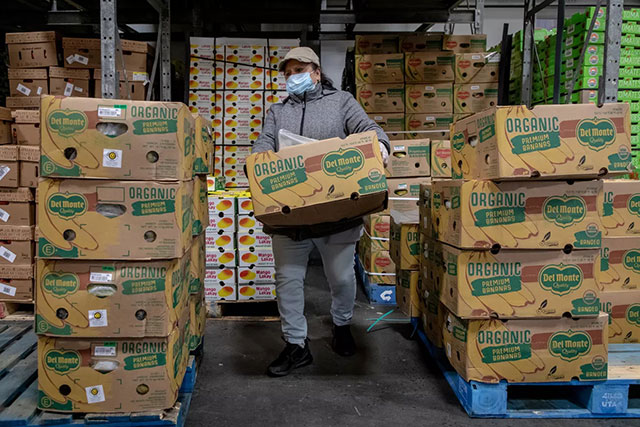
Loading and unloading at the Terminal Produce Market is backbreaking work, and all the more dangerous in the coronavirus pandemic. Hundreds fell ill with COVID, a number died. (Photo: Eater New York)
The Terminal Produce Market is one of three major distribution markets in the Hunts Point Food Distribution Center, where roughly 9,000 workers are employed. The Cooperative Meat Market distributes beef, pork, poultry and other meat products, while the New Fulton Fish Market distributes seafood. Other companies like Anheuser-Busch and Baldor, for specialty foods, also have distribution centers at Hunts Point. Many of their workers are represented by Teamster and UFCW locals. At the market, the work is intense and grueling. Many workers put in 10 and even 12 hours a day, working through the night to dispatch trucks in the early morning.
One striker told us, “Lifting is all we do. We have to take the stuff off the pallets and stack them back on. We have jacks but we have to stack the pallets first.” A retired worker said, “A lot of workers go out with back problems. Sometimes they get hit by jacks.” He added that you breathe in a lot of fumes on the loading docks: “Some guys when they blow their noses at the end of the day, it comes out black.” Another Teamster who works at a warehouse across the street told us, “This job f--ks you up. I’ve got arthritis all in my fingers, I’ve got to get knee surgery.” And then there is the coronavirus toll. This poses the need for union safety committees empowered to shut down the workplace when working conditions are unsafe.
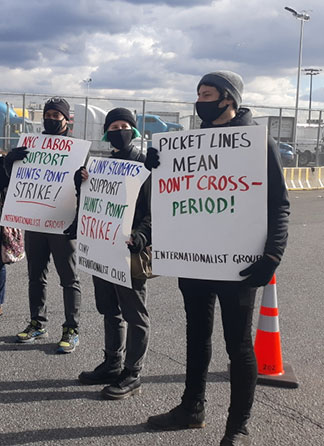 It's a bedrock principle
of labor. (Internationalist
photo)
It's a bedrock principle
of labor. (Internationalist
photo)The bosses have real contempt for the workers. On the first day of the strike, a worker who held a sign saying “Picket Lines Mean Don’t Cross” as he tried to stop a truck told us, “The boss looked at us when we asked for our raise and said, ‘What you do is nothing special. You guys should be thankful you have a job’.” There are multiple tiers at the produce market, with most Teamsters there making $18.57 to $20.70 an hour before the strike, but new hires make less. Also there are non-union, off-the-books workers hired by the trucking companies, doing even harder work with longer hours and making $15 an hour or less. What’s needed is a drive to unionize all workers in the markets, including immigrant workers who are denied equal rights and threatened by the authorities. Class-struggle militants demand full citizenship right for all immigrants, a demand that is key to uniting the working class and stopping bosses from driving down everyone’s wages.
The produce bosses hired strikebreakers to keep market operations going, and strikers were furious that even some members of Local 202 were entering through a back entrance of the market to scab. One worker told us the scabs “go in through the back like cowards. But I’ll see them inside when we get back to work.” Yet the union leadership instructed the ranks to abide by anti-union laws that “prohibit” stopping the scabs. As we said in our leaflet, and in conversations with workers on the lines, “Scabs must go! Workers must rely on their own class power to win this crucial battle.” What was needed was to mobilize New York City labor by the hundreds to help build “massive picket lines that no one dares cross, and make the Hunts Point strike the kickoff for a drive to unionize hundreds of thousands of low-wage workers (like at Amazon!) across the city.”
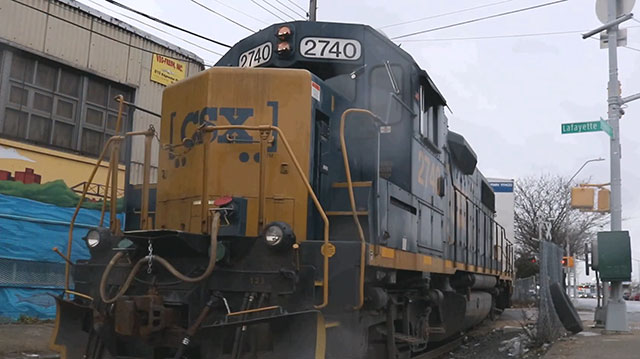
CSX train at entrance to Hunts Point Market. On Day 4 , train motorman and conductor refused to cross picket line of a single striker, saying “We’re Teamsters too.” The train headed back to Ohio. (Screenshot from Youtube)
An example of real class solidarity during the strike was the stopping of the freight train going into the market on Wednesday, January 20. Trains go in and out every night. Two nights later, as we were standing with a group of strikers, the workers proudly told us how it went down. Ramon, a picket captain was dispatched to talk to the train crew because he knew them. He reported: “The cops were saying, ‘You can’t get on the tracks, we can arrest you for trespassing.’ I said, ‘I’m not on the tracks, I’m on the sidewalk and I know the guys that are coming in.’” So when the train came in, Ramon was there with a picket sign. The conductor asked if there was a strike:
“He said, ‘I’m not crossing.’ So the cop comes in and asks the conductor, ‘You got any problems here?’ and he said ‘No, we’re not crossing the line, we’re Teamsters too.’ [The Brotherhood of Locomotive Engineers and Trainmen is now part of the IBT.] The motorman came out and he says ‘Listen, we’re not crossing the line. The only way this train is going to go in is if you call management – they’re not union.’ The cop says, ‘Oh, we’ll call management, where’s your management?’ He says, ‘In Ohio’.”
Then security tried to escort the train going in, saying “Everything is set for you, you can go right on through.” The motorman responded, “No, I’m not going through this line. I’m going back to Ohio.” And he did. The next night: no train. The night after that: a settlement.
Leo Servedio (Local 202 vice-president): “That’s the power of unity.”
Ramon.: “If we go down, we go down together.”
Leo: “We’re soldiers in arms.”
That’s the power of the bedrock labor principle: picket lines mean don’t cross!
For a Fighting Labor Movement!
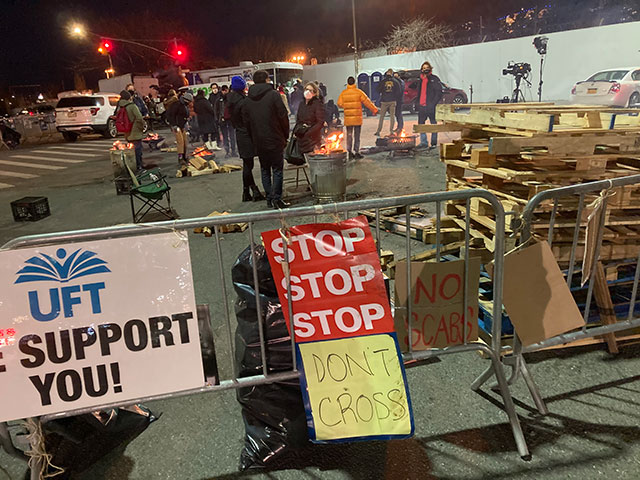
Picket lines mean don't cross, period! There should have been hundreds of union supporters from the entire NYC labor movement and its allies building picket lines so massive that no one could cross. (Internationalist photo)
Busloads of Teamsters from Boston, Philadelphia and New Jersey arrived at the Hunts Point picket, and as the strike went on, individual workers and contingents from many unions came out in support, highlighting the importance of the battle. When union VP Servedio spoke on WBAI radio (January 22) about the strike, listeners flooded the station with phone call voicing their support, together with indignation at arrests of strikers after a scab driver tried to run over pickets. Servedio described how the bosses spent tens of thousands to hire “thug security guards to try to push us around and … try to break us,” and to sneak in scabs. After discussion highlighted the importance of the picket line, one caller summed up the sentiment of many: “May the filthy scabs carry their guilt to their graves.”
Several Democratic Party politicians also showed up. First was Richie Torres, the newly elected congressman whose Bronx district includes Hunts Point. On the evening of Inauguration Day, Rep. Alexandria Ocasio-Cortez came out, which brought a lot of media attention.1. Ocasio-Cortez, the star of Democratic Socialists of America (DSA), told striking workers, “We gotta pay you like we need you, because we do.” That “we gotta pay you” is more than an off-the-cuff phrase – the Democratic Party poses as “friends of labor,” but its representatives uphold the interests of the employer class that lives off of exploiting the workers. It was a Democratic NY attorney general that wielded the anti-strike Taylor Law against MTA strikers in 2005, and another one (the “progressive” Letitia James) who had the CUNY union’s suit against layoffs struck down last summer – the list of examples is endless.
Quite a few DSAers came out to see AOC, and the DSA issued a call to come to the lines. But as a “socialist” component of the capitalist Democratic Party, the DSA is counterposed not only to a fight for socialist revolution, but also to the militant class struggle needed to revive the labor movement. As an Internationalist sign at Hunts Point said: “Break with Democrats and Republicans, Build a Class-Struggle Workers Party!” That means waging a fight that goes beyond strictly trade-union demands over wages and hours to pose a political struggle against capitalist exploitation and oppression. Hunts Point is a place to start. In the February 2017 “Day Without an Immigrant,” hundreds of workers gathered at the market entrance chanting, “respect, respect,” and it had to shut down. Then last July, Local 202 workers stood at their posts for 8 minutes and 46 seconds to protest the racist cop murder of George Floyd in Minneapolis.
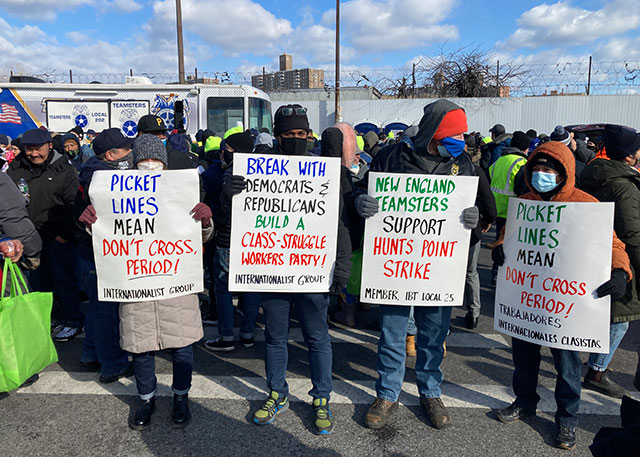
Internationalists called to break with the bosses' parties, build a workers party. (Internationalist photo)
At a post-strike press conference, Local 202 President Danny Kane said, “Workers stood up and fought. I think the workers set up a precedent. Their voices will be heard.” Yes, the Hunts Point strike gave a taste of the class struggle desperately needed to organize the unorganized and fight for millions of low-wage workers, essential and “non-essential” alike. But Kane also praised not just Ocasio-Cortez but Cuomo as well, saying “It’s that type of politics our country need.” No, working people do not need the politics of the bosses’ Democratic Party, which even when it claims to support unions only does so in order to subjugate them to capitalist “law and order.” A clear example is what the Democratic mayor of Chicago, Lori Lightfoot, is doing right now, attempting to break the power of the Chicago Teachers Union.
For Hunts Point workers, the strike showed that it is possible to win gains, however modest, against hard-nosed bosses out to squeeze ever more profit out of the workers’ toil. For our student, youth, immigrant worker and other comrades who joined in defending the picket lines, it was an energizing experience of class struggle. The task now is to organize militant struggle against the whole decaying capitalist system. To build up union power, we need to forge a class-struggle leadership of labor, break the chains binding the working class to the Democratic Party and build a workers party that champions all the oppressed in the fight for a workers government. ■
- 1. AOC said she and others did not “feel safe” at the Inauguration after the January 6 racist mob invasion of the Capitol. Revolutionary Marxists denounce the dangerous misogynist and racist threats launched against AOC, Ilhan Omar and others, at the same time as we uphold the fundamental Marxist principle of working-class political independence from and opposition to the Democratic, Republican and all other capitalist parties.